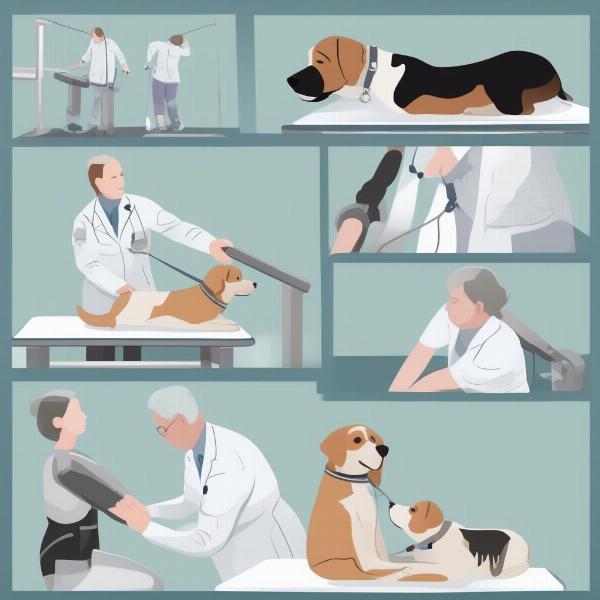A dog hunched back can be a sign of various underlying issues, ranging from minor discomfort to serious medical conditions. Understanding the reasons behind this posture is crucial for providing appropriate care and ensuring your dog’s well-being. This article explores the potential causes of a hunched back in dogs, discusses diagnostic procedures, and outlines treatment options.
Common Causes of a Hunched Back in Dogs
A hunched back, also known as kyphosis, can stem from several factors. Musculoskeletal problems, such as intervertebral disc disease (IVDD), arthritis, and muscle strains, are common culprits. [weiner dog back brace](https://ilmdog.com/weiner-dog-back brace.html) are often used for breeds prone to back issues. IVDD, particularly prevalent in Dachshunds, can cause severe pain and nerve compression, leading to a characteristic hunched posture. Arthritis, a degenerative joint disease, can also cause pain and stiffness, resulting in a hunched back.
Other causes include gastrointestinal issues like pancreatitis or colic. colic in dogs can cause intense abdominal pain, leading dogs to adopt a hunched posture to alleviate discomfort. Infections, such as discospondylitis (infection of the spinal discs), can also contribute to a hunched back. Additionally, injuries, like fractures or spinal trauma, can cause a dog to hunch over in pain.
Diagnosing a Dog Hunched Back
Diagnosing the underlying cause of a hunched back requires a thorough veterinary examination. Your veterinarian will assess your dog’s posture, palpate the spine and abdomen, and evaluate their range of motion. Diagnostic imaging, such as X-rays, CT scans, or MRIs, may be necessary to identify specific issues like IVDD, fractures, or tumors. Blood tests can help rule out infections or other systemic illnesses.
Treatment Options for a Hunched Back in Dogs
Treatment for a dog hunched back depends entirely on the underlying cause. For musculoskeletal issues like IVDD or arthritis, pain management is crucial. This may involve medications, such as non-steroidal anti-inflammatory drugs (NSAIDs) or pain relievers. Physical therapy, including exercises and stretches, can help improve mobility and strengthen muscles. In severe cases of IVDD, surgery might be required to decompress the spinal cord. If the cause is gastrointestinal, treatment will focus on addressing the underlying condition. For example, pancreatitis might require hospitalization, fluid therapy, and pain management.
 Dog receiving physical therapy for a hunched back
Dog receiving physical therapy for a hunched back
Conclusion
A dog hunched back is a symptom that should never be ignored. Prompt veterinary attention is crucial for accurate diagnosis and appropriate treatment. Addressing the underlying cause is essential for alleviating your dog’s discomfort and improving their quality of life. Remember, early intervention often leads to better outcomes.
FAQ
- What should I do if my dog suddenly develops a hunched back? Immediately contact your veterinarian for an appointment.
- Is a hunched back always a sign of a serious problem? Not necessarily, but it’s always best to have it checked by a vet.
- Can a hunched back be prevented in dogs? Maintaining a healthy weight, providing appropriate exercise, and using supportive bedding can help prevent some musculoskeletal issues.
- How long does it take for a hunched back to resolve? Recovery time depends on the underlying cause and the chosen treatment.
- What are the long-term implications of a hunched back? Untreated, a hunched back can lead to chronic pain, mobility issues, and decreased quality of life.
- Are certain breeds more prone to developing a hunched back? Yes, breeds like Dachshunds, Bulldogs, and French Bulldogs are more susceptible to certain conditions that can cause a hunched back.
- Can a bulging disc in dogs neck also cause a hunched back? While a bulging disc in the neck can cause neck pain and stiffness, it might also contribute to an overall hunched posture due to discomfort.
About ILM Dog
ILM Dog is your trusted resource for comprehensive dog care information. We offer expert advice on dog breeds, health, training, nutrition, grooming, and much more. Our aim is to empower dog owners with the knowledge and resources they need to provide the best possible care for their canine companions. From choosing the right breed to understanding complex health issues like a hunched back, we’re here to help. For personalized guidance and support, connect with our team of experts. Contact us at [email protected] or call us at +44 20-3965-8624. We offer a range of services, including breed selection guidance, personalized health and training plans, and product recommendations. ILM Dog provides expert, reliable, and practical advice for dog owners worldwide.